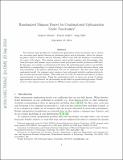Randomized Minmax Regret for Combinatorial Optimization Under Uncertainty
Author(s)
Chin, Sang; Jaillet, Patrick; Mastin, Andrew
DownloadRandomized minmax.pdf (243.5Kb)
OPEN_ACCESS_POLICY
Open Access Policy
Creative Commons Attribution-Noncommercial-Share Alike
Terms of use
Metadata
Show full item recordAbstract
The minmax regret problem for combinatorial optimization under uncertainty can be viewed as a zero-sum game played between an optimizing player and an adversary, where the optimizing player selects a solution and the adversary selects costs with the intention of maximizing the regret of the player. The conventional minmax regret model considers only deterministic solutions/strategies, and minmax regret versions of most polynomial solvable problems are NP-hard. In this paper, we consider a randomized model where the optimizing player selects a probability distribution (corresponding to a mixed strategy) over solutions and the adversary selects costs with knowledge of the player’s distribution, but not its realization. We show that under this randomized model, the minmax regret version of any polynomial solvable combinatorial problem becomes polynomial solvable. This holds true for both interval and discrete scenario representations of uncertainty. Using the randomized model, we show new proofs of existing approximation algorithms for the deterministic model based on primal-dual approaches. We also determine integrality gaps of minmax regret formulations, giving tight bounds on the limits of performance gains from randomization. Finally, we prove that minmax regret problems are NP-hard under general convex uncertainty.
Date issued
2015-11Department
Massachusetts Institute of Technology. Department of Electrical Engineering and Computer Science; Massachusetts Institute of Technology. Laboratory for Information and Decision Systems; Massachusetts Institute of Technology. Operations Research CenterJournal
Algorithms and Computation
Publisher
Springer-Verlag
Citation
Mastin, Andrew et al. “Randomized Minmax Regret for Combinatorial Optimization Under Uncertainty.” Lecture Notes in Computer Science (December 2015): 491–501 © 2015 Springer-Verlag
Version: Original manuscript
ISBN
978-3-662-48970-3
978-3-662-48971-0
ISSN
0302-9743
1611-3349